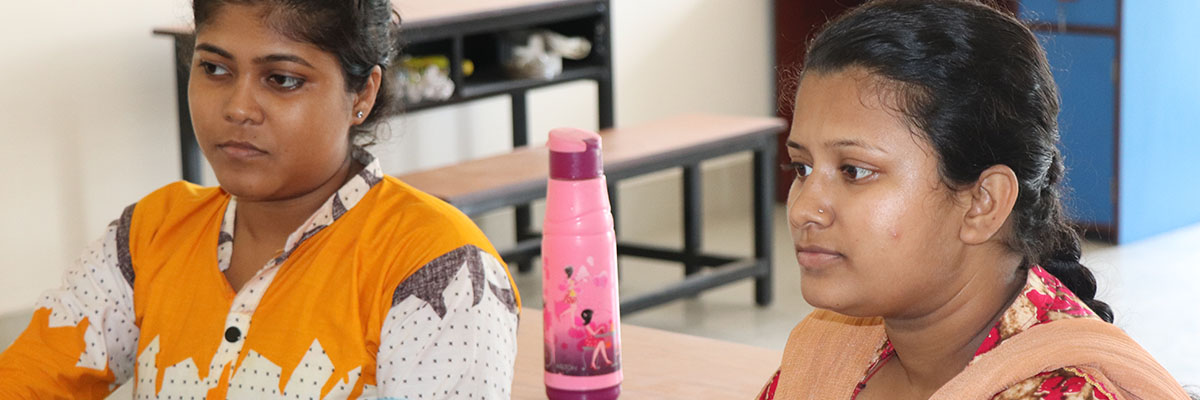West Bengal
State University
(Barasat, North 24 Parganas)
- registrar@wbsu.ac.in
- 033 2524 1976
- Berunanpukuria, P.O. Malikapur, Barasat,
North 24 Parganas, WB, PIN 700126

The Post-Graduate Department of Sociology, WBSU was established in 2008. Located in the fifth floor of the academic building of the university it presently has three faculty members (one assistant professor and two professors) supported by guest faculties (from other universities, colleges and research institutes) and a temporary teaching assistant.
Interdisciplinary approach with a special focus on gender-equity is a defining feature of the post-graduate programme offered by the department. Interdisciplinarity can only enrich the understanding of the world for each discipline, after all, offers but a partial perspective. The post-graduate course comes to traverse multiple disciplines ranging from Women’s Studies, Post-Colonial Studies, Social Anthropology, Semiotics, Politics, Literature, Rural Studies, Cultural Studies, Economics, Statistics, Mass Communication, Film Studies to Demography and Law while engaging with Sociological Theory and Research Methodology. Gender-equality, besides being a fundamental human right, is essential for the sustainable growth of a developing nation like India. The post-graduate course in Sociology tends to develop analytical tools to think independently and investigate the central questions around gender equality and how they influence power and knowledge structures.
The department considers the students as its most valued asset. They are often first-generation learners coming from semi-rural, economically challenged, marginal families or groups. In certain ways their experiences of living every-day in peripheral situations help us grasp the socioeconomic realities of the contemporary times. The students provide the impetus to find out ways of harnessing diversity, creating fairness, and ensuring that the learning environments engage and achieve the best outcomes for all individuals, not just a few. The teachers attempt to uphold a sense of self-respect among the students linking up their personal lives with the social and theoretical interpretations.
The faculty members of the department combine their commitment to research with a devotion to teaching. In the class-room teaching the students receive personal attention from their professors. The interactive teaching-learning process is supplemented by regular tutorials, group-discussions; dissertations and presentation of assignments. The CBCS semester system of the post-graduate classes is carried out in a continuous evaluation system. The written examination is complemented by internal and external assessments of group-discussion, paper writing, content analysis, poster, flow-chart, power-point presentation, and viva-voce. The regular teaching-learning of the department goes together with a series of conferences, seminars, workshops and special lectures where the students come to interact with the eminent national and inter-national scholars and have an exposure to the wider discourses of the discipline.
Initiated with only nine PG Students, the department treaded a long journey while also offering its PhD Program since 2011. Currently, the department has 11 scholars pursuing their research work. Two scholars have received their degrees in the year 2018. The department has a small yet successful set of alumni placed in government and private colleges, schools, government and non-government organizations and corporate offices.
The department provides a steady leadership to the sociology departments of the nineteen undergraduate colleges affiliated to the university. Holding a number of workshops and brain-storming sessions in different colleges the department has played a primary role in initiating the CBCS curriculum in the Undergraduate Colleges. The department has also facilitated the setting up of sociology departments in various colleges and the development of an integrated UG curriculum, pedagogic structure and examination-evaluation system.
| Name | Designation | |
|---|---|---|
| PROF. RAMANUJ GANGULY | PROFESSOR | rg.wbsu@sociologist.com |
| PROF. RITU SEN CHAUDHURI | PROFESSOR | riturmail@gmail.com |
| DR. TITIR CHATTERJEE | ASSISTANT PROFESSOR | ttrchttrj@gmail.com |
| Name | Designation |
|---|
| Programme | Level of study | Eligibility |
|---|---|---|
| M.A. (2 yrs. duration) | PG | B.A. (Hons.) |
Head,
Department of Sociology, West Bengal State University,
Barasat, Kolkata-700126, WB, India
Fax: 033-25241977/ 033-25241978